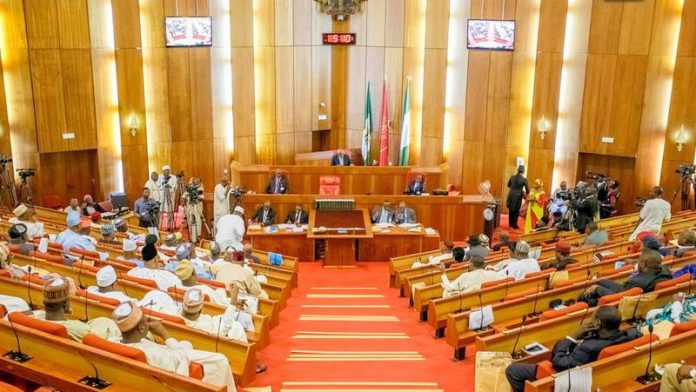Worried by the menace of drug abuse in Nigeria, the Senate has urged the federal government to declare state of emergency to tame the menace.
Indeed, the upper legislative chamber also mandated its committee on drugs and narcotics, to liaise with relevant agencies of government to convene a national discourse on drug abuse.
The senate mentioned agencies such as National Drug Law Enforcement Agency ( NDLEA) and National Agency for Food Drugs Administration and Control ( NAFDAC) to fight the menace.
Specifically, the red chamber declared that the two steps are very important for relevant stakeholders to take in order to properly understand the root causes of the crisis.
The resolutions followed a motion sponsored to that effect by Senator Hussaini Babangida-Uba ( APC Jigawa Northwest).
Senator Hussaini in the motion titled : ” Urgent Need to address the menace of drug abuse in Nigeria” , highlighted a report by the United Nations office on drugs and crimes which indicated that Nigeria has about 14.3 million persons between the ages of fifteen and sixty four that are involved in drug abuse.
“Nigeria is presently facing a rise in drug abuse which has reached an unprecedented level transforming from a mere transit route in the 1990s, into a country filled with drug abusers and drug traffickers all over its land space.
“The report added that 10.6 million addicts were cannabis users, 4.6 addicts used pharmaceutical opioids and 238,000 drug abusers used amphetamines.
“It further revealed that the prevalence of drug use per geo-political zone as far back as 2017 shows that the North West accounted for 12% (3,000,000), North East 13.6% (2,090,000), North Central 10.0% (1,500,000), South West 22.4% (4,382,000), South South 16.6% (2,124,000) and the South East zone 13 8% (1,550,000)”, he said .
He bemoaned that a significant number of deaths from accidents and violent crimes have been traced to the activities of persons under the influence of drugs, especially the discovery of more dangerous substances called ‘Kurkura’ in the North and ‘Umkpromiri’ in the South.
The prevalence of drug abuse in the country, he pointed out was a public health challenge which seems to be on the increase despite interventions by the international, regional, federal and state bodies through laws, policies and technical support.
He wondered that the war against drug abuse by the National Drug Law Enforcement Agency, NDLEA and other relevant institutions were not providing the required result, and therefore stressed the need to include special drug education as a compulsory subject in the country’s basic education.
He warned that “the consequences of drug abuse will continue to endanger our national development, public safety and family system if urgent action is not taken to strengthen the existing legal, policy and institutional frameworks to face the challenges with all sense of responsibility.”
Meanwhile, lawmakers present at Tuesday plenary canvassed for action against drug abuse.

Call:
Sandra - 07069148333
Pauline - 08174374150
Scholastica - 09060678434













